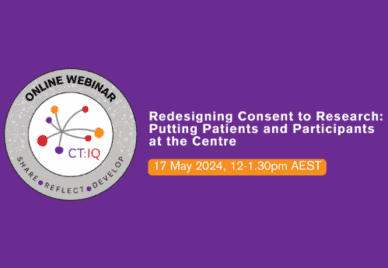
Redesigning Consent to Research: Putting Patients and Participants at the Centre
Go to partner eventabout Redesigning Consent to Research: Putting Patients and Participants at the Centre
The COVID-19 crisis has highlighted the importance of access to global data, a familiar topic to data infrastructure expert Kheeran Dharmawardena.
In late March, when the European Commission asked the Research Data Alliance (RDA) to develop a set of global guidelines and recommendations for data sharing in response to the crisis, Kheeran Dharmawardena served as one of the moderators in the community participation theme.
Kheeran has been addressing the gap between information infrastructure and users over the past two decades. His background includes providing ICT services across the higher education and research sectors, including Monash University, the University of Melbourne, ARDC’s Nectar Research Cloud and the Atlas of Living Australia. He’s currently the principle consultant at Cytrax Consulting and also co-chairs the Virtual Research Environments and the Social Dynamics of Data Interoperability interest groups at the RDA. He also founded and co-chairs the Australian Geospatial Capabilities community of practice.
Following the RDA’s publication of its report, COVID-19 Recommendations and Guidelines for Data Sharing, Dharmawardena provided some insight on the project and the importance of data access.
Why did you join the group?
From the start of the crisis it was clear that the world was looking to data to help inform our response to the pandemic. My background is in developing socio-technical solutions for data infrastructures. I’ve been involved in guiding how we generate, use and manage data for effective use, so this was the most impactful way that I could contribute my expertise towards helping with the COVID-19 challenge.
What are the biggest benefits of the project and report?
When adopted, these guidelines will help make our response to the pandemic more effective, with less time lost in non-productive activities. If this work improves the time it takes to develop a vaccine by a day, we save thousands of lives. If it enables faster contact tracing, we save thousands of lives. If it enables increased confidence in cross-country testing and allows trade to resume, it saves thousands of jobs and makes it easier for economies to recover.
Do the results have broader applications?
Although the motivation for this project was the COVID-19 pandemic, the information applies to and should be applicable to any medical emergency. If the guidelines and recommendations are broadly adopted by different actors around the world — reducing the friction in the use and reuse of data – it would make the exchange of data easier and improve response times, regardless whether it is a local or global emergency.
The project was completed in 10 weeks; what were the pluses and minuses of producing a report in such a short time?
The statement, “Never let a good crisis go to waste,” keeps getting thrown around these days — this is a great example of putting it to work.
Pre-COVID, this type of report would have typically taken RDA years to produce. The urgency of this situation made it possible to achieve what would have previously been considered impossible. It forced us to focus on what was practical and applicable, instead of aiming for a perfect solution. Furthermore, it was done entirely virtually. This is unprecedented for RDA, which has always relied on face-to-face meetings to progress its work.
I can’t see any negatives, apart from lots of lost sleep and a few extra grey hairs.
What’s the value of the international research collaboration?
Immeasurable. RDA brings together a broad group of data professionals across the world. The discussions and work facilitate a convergence of ideas, thoughts and practices across the world. Members take these to their respective organisations and local networks and things get implemented. The shift it accomplishes on a global scale is huge — akin to turning the Titanic. Achieving a small change at this scale leads to a large impact in the long run.
What did you learn from this experience?
When the conditions are right, the impossible becomes possible!